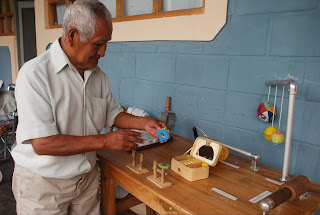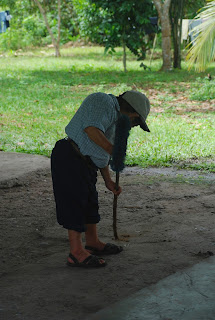As on most days in the Selva region, it begins to rain just before lunch time. Thankfully, the asylum rooms and dining area are connected via roof-covered sidewalks.
Visiting the poorest of the poor:
Several weeks ago, Francis and I visited a Catholic asylum in Rioja, a neighboring city, that cares for abandoned handicaped, psychotic, and elderly persons. This week, I visited on my own and have pictures to share about my experience.
The asylum front yard is kept trimmed by the town's plaza service workers.
Before I recount some of my observations, I shoud explain some ideas that have preconditioned my experience in the asylum. I received a comment in response to one of my early posts reccommending the book When Helping Hurts: how to alleviate poverty without hurting the poor and yourself by Steve Corbett and Brian Fikkert. Gaining access to the book, I found aspects of its themes and ideas insightful, affirming some of the inferences I had begun to make from my experiences. The authors define poverty as "the result of relationships that do not work, that are unjust, that are not life, that are not harmonious or enjoyable. Poverty is the absence of Shalom in all its meanings" (Ch. 2). They refer to the relationships between a person and self, God, others, and the rest of creation. "Poverty alleviation," they suggest, "is the ministry of reconciliation: moving people closer to glorifying God by living in right relationship with God, self, others and the rest of creation" (Ch. 3). Since it is necessary to be consciously attentive to all kinds of poverty (including poverty of being, spiritual intimacy, community, and stewardship) for successful and integral improvement, material poverty alleviation, in their perspective, involves "working to reconcile the four foundational relationships so that people can fulfill their callings of glorifying God by working and supporting themselves and their families with the fruit of that work" (Ch. 3). I found this integral web of associations to ressonate with what I perceived to be the perspective from which the root causes of poverty should be addressed. Echoing this idea, an anabaptist writer, David Augsburger, in offering his "tripolar spirituality" model of discipleship, suggests that relationships with self, God, and others are indivisible and that ignoring any one of these "poles" leaves genuine and healthy spirituality crippled and conflicted reagarding topics such as just war, self identity, forgiveness, etc (Discident Discipleship). Another book that was recently recommended to me urges conscious attention to feelings, (unmet) needs, and requests that seek to meet needs for resolutoin. Focusing on enriching life on the "monopole" of self-identity/humanity, this approach for improving communication suggests that "when we settle our attention on other people's feelings and needs, we experience our common humanity" (pg 151, Nonviolent Communication: a language of life, by Marshall B. Rosenberg). Treading these paths of thought before arriving in the asylum leads me to the following observations and reflections:
The elderly gentlemen spend most of their days like this, listening to their radios, sleeping, or just sitting.
A more active resident shows me the exercise table that allows various manipulations to exercise finger, hand, and arm muscles.
Daniel, the cook's son, accompanies me as I make a round to greet the residents.
I was told that this gentleman is deaf and nearly blind. He is always asleep but we wake him with a handshake greeting. He was very comforted to hold Daniel's hand and stroke his head.
To give you a sense of context and attempt to place you in my experience, I will quote some residents: "My whole body hurts; nothing works; I can't eat, I can't pee"..."I have pain, burning pain at night; the pain is horrible" (touching just below right ribs)..."My leg is still bad; it hurts"..."Hello, good morning; I am deaf and blind but I am sane; were it not for my blindness and deafness I would not be here; I am in my right mind" (not hearing anything I said in reply, saying, "a pleasure," when he sensed my hand leaving the handshake)..."Hello, what is your name, where are you from, what's new in Moyobamba? What neighborhood do you live in; oh, near..."...."Hello mamita, I am from Moyobamba, my name is ____, a pleasure, mamita, what is your name, where are you from mamita?(approaching me suddenly with his dialogue and getting closer still with his arm wrapped around my waist)..."From two different countries; you girls are good youth for coming here to visit us ugly old people; so many youth have so much to entertain themselves, like the internet; God has a purpose and plan for you" (I replied that the things of the youth's interest do not bring enjoyment but that we enjoy serving people and that we hope that God has a purpose for us) "I came to the truth when one Catholic gave me the Bible. Those evangelicals were always wanting to argue" (I asked, 'but now you're an evangelical?' Silence)...[inaudible mouthing and sounds, lots of emotion and expression but no comprehension on my part; clinging to my hand; pausing his speech and ending when my hand left his]...[no discernible sounds, just movements after awaking; he prefers the child's hand and reaches to touch his head and arm; staying with his hand when sensing his discomfort, just content to hold someone's hand, a young child's hand]..."Hello, thank you" (I heard after shaking his hand and asking how he was, replying to my own question, motioning to his magazines/newspapers and not quite touching them, asking to take a picture)...[no response, he picks at a fold in his pants, looking down; his hand barely moves to accept my handshake]...[she does not say anything, although I greet her first; she does not smile like she had the first time I met her, she simply gazes, cross-eyed, at my face as long as she can keep her head up; she makes no sound as I move to the old ladies; she is not fed lunch]..."Everything is tranquil; yes I am reading the Bible; this table is from Germany" (shows me the different exercises)..."I am here, like this" (says nothing more about his condition, I don't know what more to ask)..."Oh, you poured them too much juice; they don't need much; they'll just pee more" (so as the cook sugggested, I filled the remaining 7 cups from full cups, equating ~5/8 cup of juice for each resident).
The ladies are usually a bit more emotional about our visits, kissing our hands or calling us "little daughter" or "little mom."
Oscar enjoys collecting newspapers and magazines. He carries them everywhere, sleeps with them, and lets no one touch or read them. He is a bit more responsive than the other psychiatric residents and accepts a picture with Daniel.
One of the most active residents grinds a toasted herb for soup seasoning. He enjoys sharing his hymnal with visitors.
This gentleman complained of 'horrid pain,' but continues to be active.
I believe this resident was fixing a broom. I don't think I have ever seen an old man crouch down like that for so long.
As a volunteer washes floors in the rooms, a resident cares for her son. To me, they seem more simiar to each other than either to the boy's mom.
Similarly to what I felt after the first visit, the compilation of observations from the asylum in my mind screams, 'These folks are so deeply impoverised (no material independence, no intellectual stimulation, such little relational 'posession'); but most basically, they are deprived of genuine human contact and empathy!' I am surprised that they don't seem to seek it in each other or God. They are clingy, like children with attachment disorders...they are abandoned, much like orphans. What do the visiting church fathers provide in the 'special gathering room'? Wouldn't it be great to restore the connection between each isolated individual with God, themselves, and their neighbors? Discussing the center's struggles at the clinic, we were told that Evangelical churches from the city are uninterested in working with the elderly as these are not 'conquering fields,' besides the difficulty and resistance of working accross denominations with a Catholic center. These to me seem like very shameful and lame reasons not to minister to the needs of this population. Spending several hours with these folks might do many a lot more good than two prayer meetings and a youth/women's/men's group meeting each week. Is it the formality of such church busy-ness that often tires Christians? or is it just this...that these practices are only "bipolar" and thus flawed and broken, unable to serve in the enrichment of healthy spirituality without practical love for neighbor? (sigh)...is it ok to rant about the problems?...lamenting their existence, are we brought to resolving them? meeting the unmet needs.... I hope so; otherwise, I don't want to be a grouch. In any case, thus interacting with the residents stirs in me a fervent desire to give them a sense of dignity and contentment in their remaining peaceful years.
Residents await ringing of the lunch bell.
Daniel eats his early portion.
Upon sounding of the bell, Oscar wheels one of his table mates to the dining area, his papers under one arm and jacket under the other (I think he likes to keep the jacket by him at all times, also).
Getting to and from meals seems to be the extent of some residents' daily movements. It is often a team effort to make sure everyone makes it to the dining area.
The most active resident also seems to be the leading spokesperson. He leads the group in a talk or prayer, ending with christening, "in the name of the Father, the Son, and the Holy Spirit," at which time some are already reaching for their utensils and bowls. Oscar seems to consciously practice in the ritual.
A plaque identifies the asylum with its sponsering church fathers.
More school visits:
I visited several more schools with my oral health lesson this week. Getting more and more comfortable with the flow of the topics covered (in Spanish), I am able to pay more attention to the students, both engaging them and watching for their responses. I find it very pleasing to be inside these wriggling classrooms, where the kids are oth eager to learn something new but also can't wait for school to end so they can climb a tree or run after the 'big kids' (morning school sessions are for grades 1-6). The energy and sense of opportunity makes me want to give them all that they need to be content and productive individuals in the future. I suppose as far as oral health goes, that is what I am doing there. ...so perhaps I need not contemplate leaving dentistry for teaching to occasionally find myself in front of a classroom.
After the lunch dishes were washed, the sole nurse on staff (and cook) went about preparing Juanes, the famous food of the Selva region. The Saint of Moyobamba is St. Juan and his festival is in June, during which this meal is especially important.
Large banana leaves are passed over fire and are so made fexible to wrap the edible part of the Juane.
Seasoned rice and a piece of meat are wrapped in a leaf and tied with string into a round or rectangular package.
After boiling for about 45 minutes, the Juanes are ready to be unwrapped and enjoyed.
I am not sure how mandatory such a grand fire is to the success of Juanes but it probably is one of the unique components of the cultural dish that can't be replicated on an electric stove top.
During the last week of my service in Peru and the conclusion of my 1/3 year internship, I will visit several more groups of kids with my oral health lesson, perhaps visit the asylum for the last time, and try to connect the dots of my route during these past four months. Hopefully realizing where I have arrived for the moment, I'll be prepared to return home to family and begin the transition into dental school.























No comments:
Post a Comment